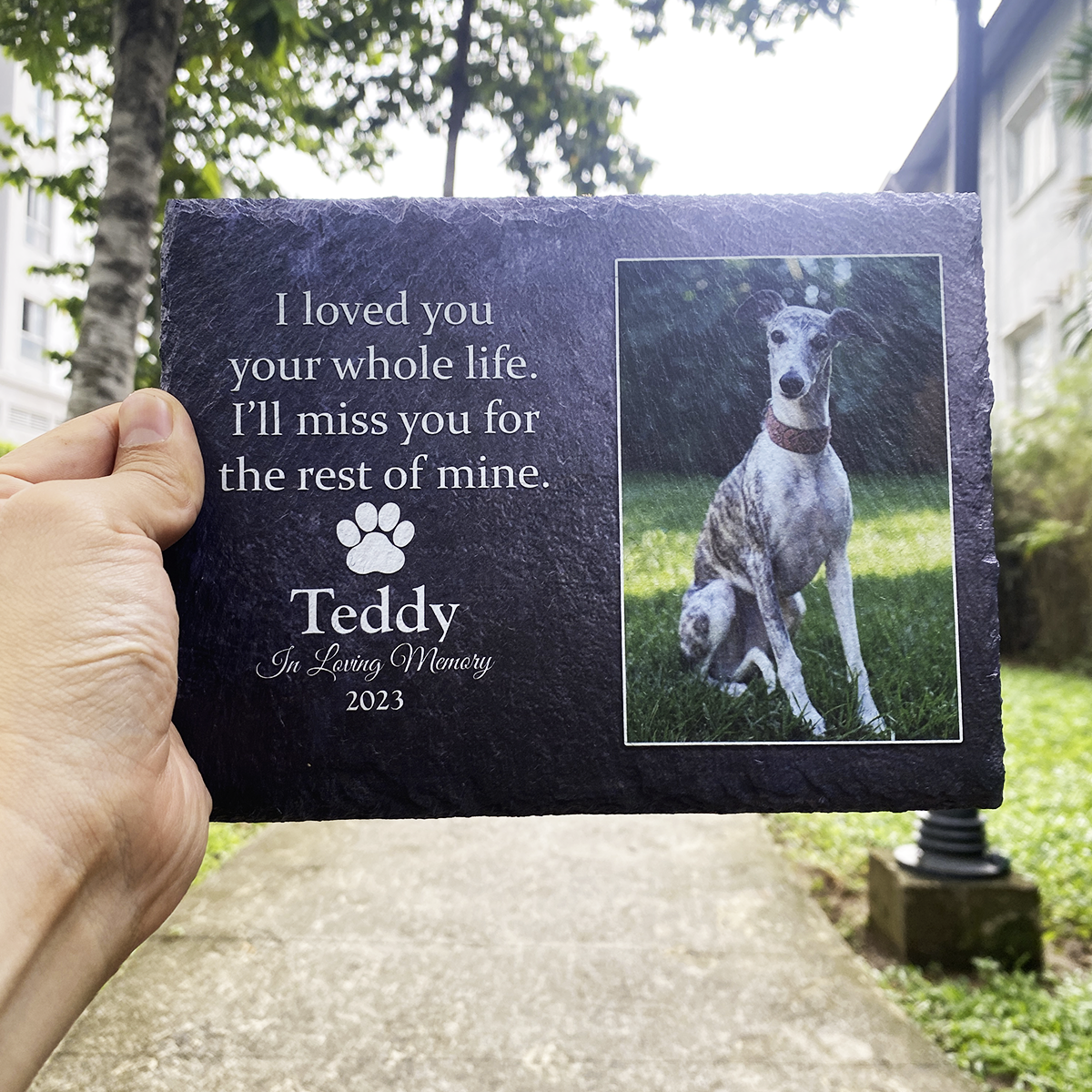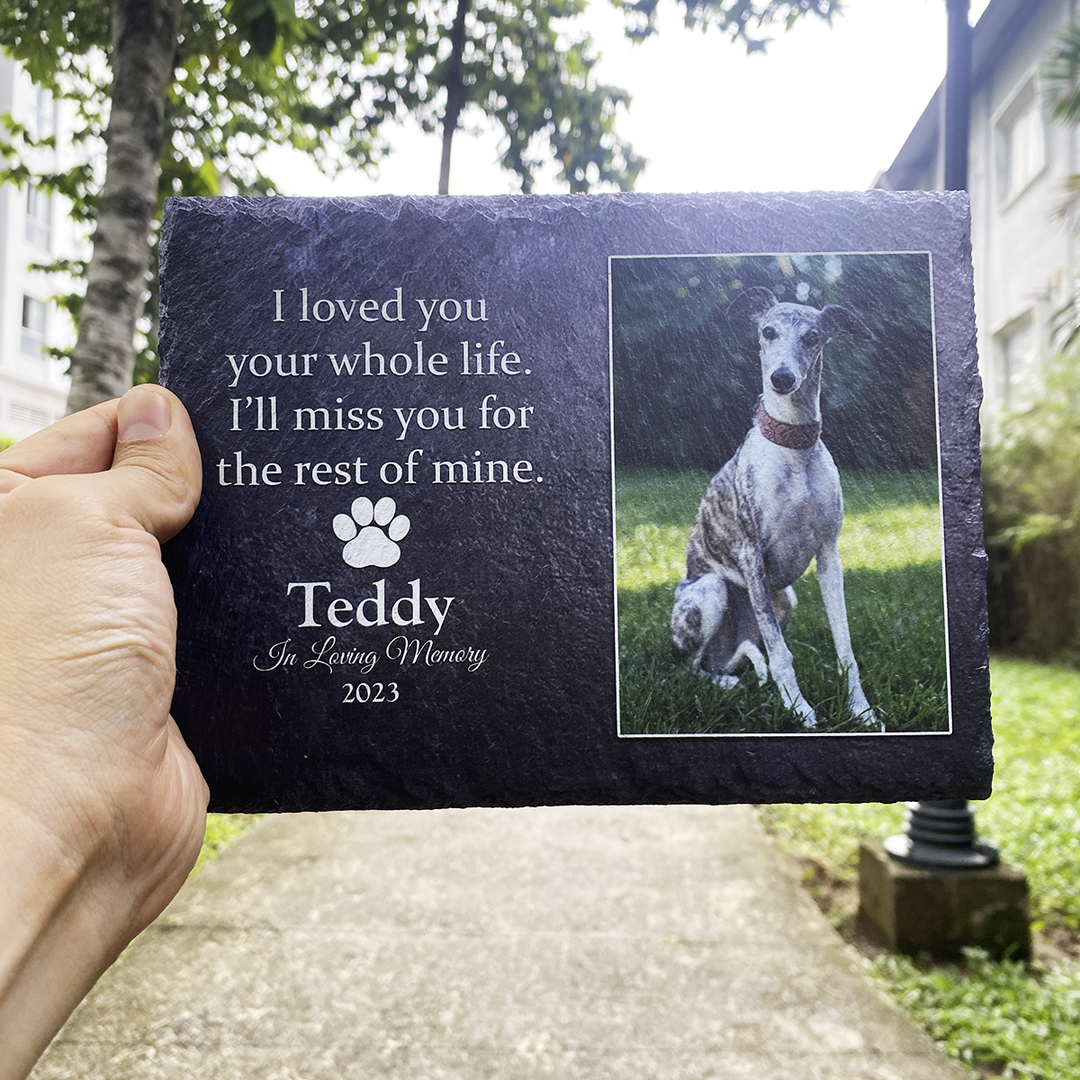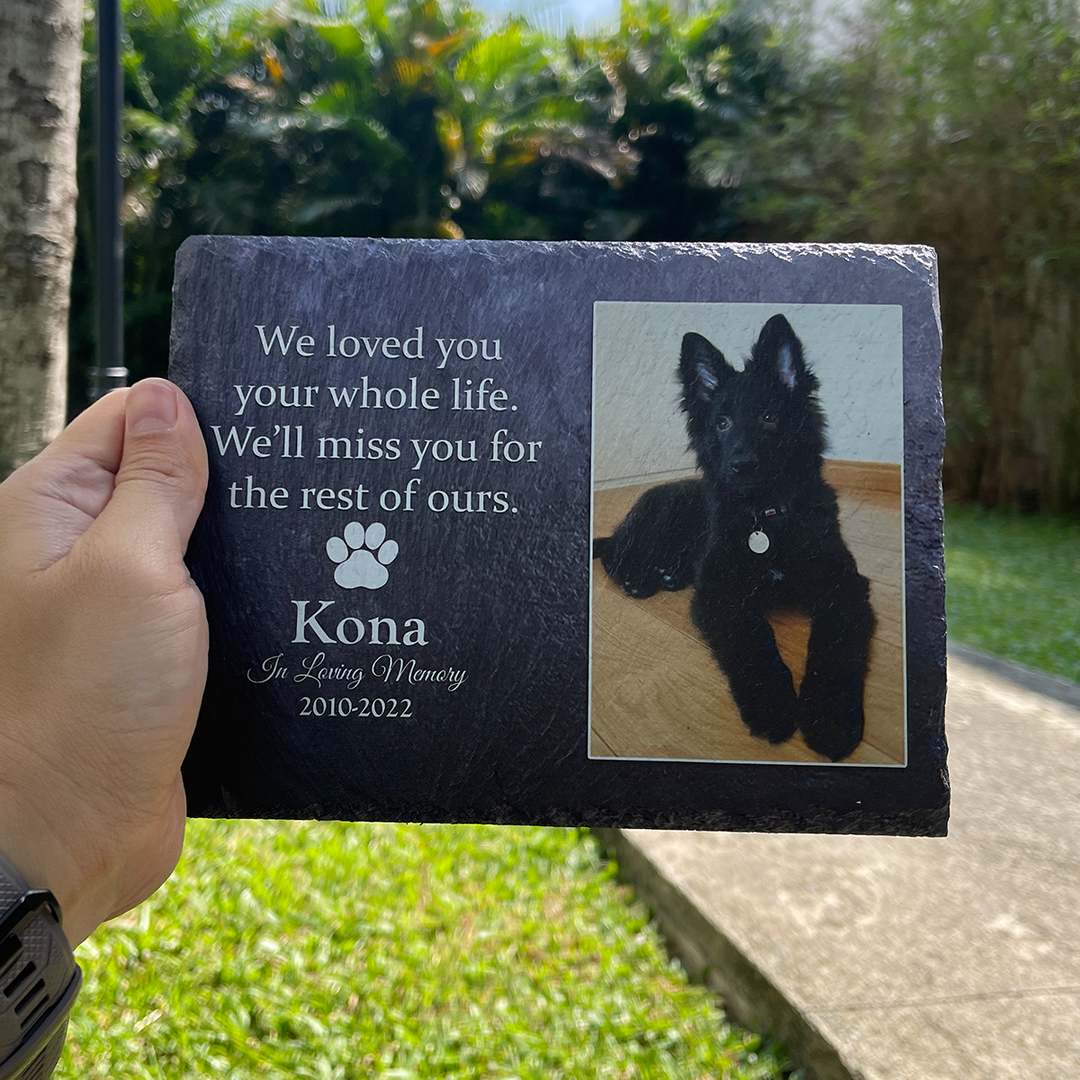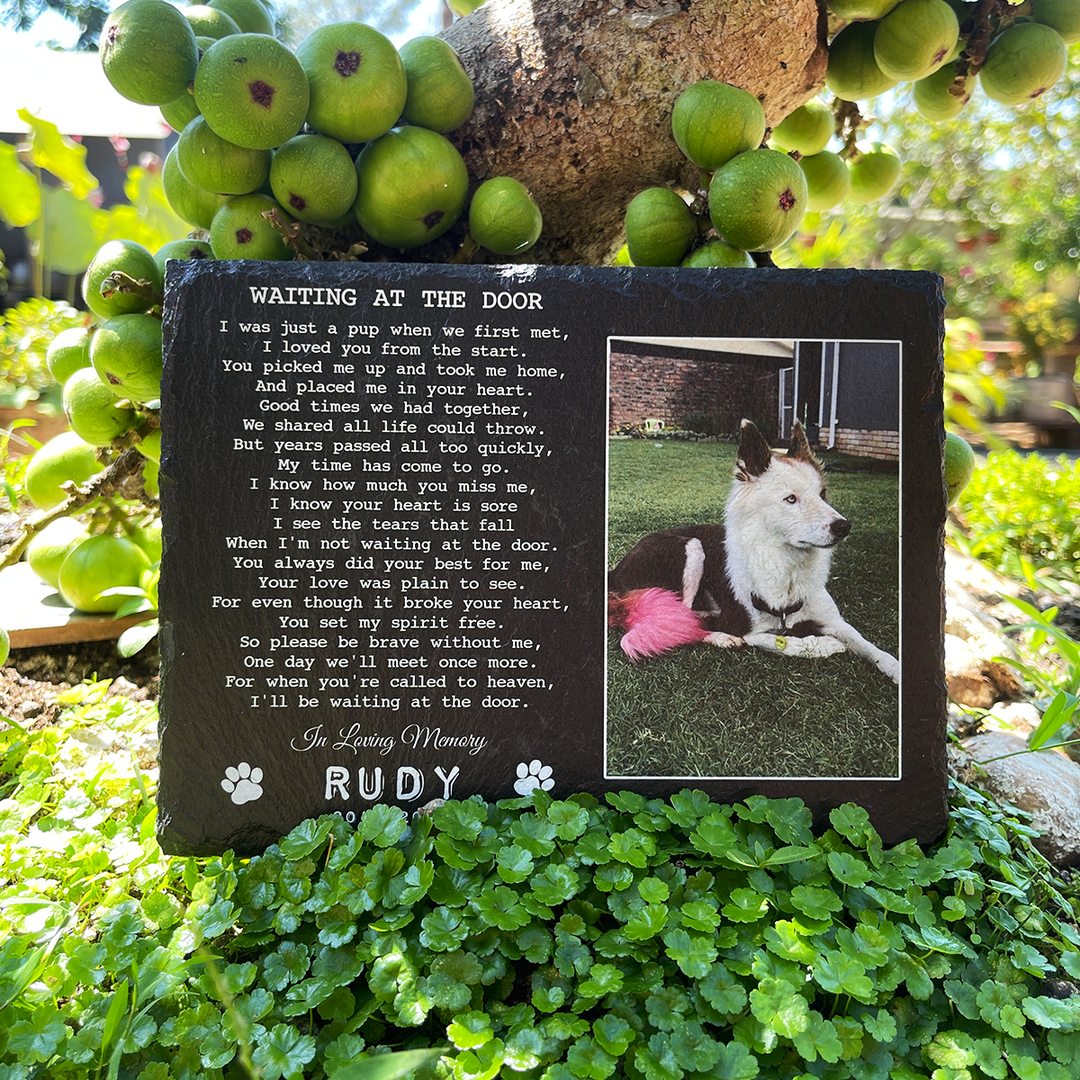Best Selling- Dog Memorial Stone
View allHelping Children Cope with the Loss of a Dog: Parent's Guide to Dog Grief
As a parent, guiding your child through the intricate landscape of grief can be a challenging and emotional journey. In this parent's guide to dog grief, we aim to provide compassionate support and understanding as you help your child navigate the profound loss of their furry family member.
Set against the backdrop of the emotional impact of losing a beloved dog, we engage readers with relatable anecdotes and heartwarming stories that showcase the unique bond between a child and their loyal canine companion. Together, let us embark on a path of healing and resilience, illuminating the way for your child during this tender chapter of their lives.

Understanding the Impact of Dog Loss on Children
Coping with Dog Loss: The Unique Bond Between Children and Dogs
When it comes to coping with dog loss, it is crucial to understand the unique bond that forms between children and their furry companions. This bond extends beyond words, encompassing a deep connection built on trust, affection, and unwavering loyalty.
Dogs become not just pets, but beloved family members who offer unconditional love and companionship. When a child loses such a treasured friend, the impact can be profound, leaving them grappling with a range of emotions.
Unpacking the Effects of Dog Loss on Children
The experience of dog loss can elicit a variety of emotional reactions in children. Grief and sadness are common, as they mourn the loss of a source of joy and comfort in their lives. Alongside grief, children may also experience feelings of loneliness and longing, acutely aware of the absence of their devoted companion. Guilt often emerges as they question if they could have done more to prevent their dog's passing.
Additionally, anger and frustration may arise, fueled by the unfairness of the situation. By recognizing and understanding these emotional responses, parents can offer the necessary support and empathy to help their child navigate the grieving process.
The Crucial Role of Parent's Guide to Dog Grief
In coping with dog loss, parents play a vital role in recognizing and validating their child's grief. It is essential to create an environment where their emotions are acknowledged and accepted. Encouraging open and honest conversations about their feelings can help children express their grief more effectively.
By using compassionate language and showing empathy, parents can assure their children that their emotions are valid and natural. Recognizing the significance of their bond with their dog and the depth of their loss, parents can provide the comfort and understanding needed for their child to heal and cope with their grief.
Communication and Honesty: Nurturing Understanding and Trust
Sharing the Impact of the Dog Loss
Honest and open communication about the dog's death is vital for helping children cope. By discussing the emotional influence it has on the family, parents create a supportive environment where children can express their feelings and find solace. This open dialogue fosters unity and connection during the grieving process.
Guiding Children through Loss
Addressing the topic of death and loss with children requires sensitivity and age-appropriate explanations. Utilize a language that matches their level of understanding, providing clear and concise information without overwhelming them. Use concrete examples and metaphors to help them grasp the concept of death.
Encourage questions and actively listen, ensuring that children feel heard and supported. Tailoring the conversation to their age and developmental stage helps them comprehend the dog's passing in a way that is meaningful and less daunting.
Answering Truthfully: Honesty as a Foundation
When children ask difficult questions about the loss of their dog, parents should provide truthful responses. Being honest builds trust and allows children to process their grief authentically. Tailoring the information to their age and offering compassionate answers fosters understanding and supports their healing journey.
Parent's Guide to Dog Grief: Creating a Safe and Supportive Environment
Designated Space for Expression
To help children cope with dog loss, consider creating a memorable space where they can freely express their feelings and memories. This designated area can be a quiet corner in their room or a cozy nook in the house. Fill it with comforting items like pillows, stuffed animals, memorial keepsakes or photographs of the dog. Encouraging children to spend time in this space allows them to process their emotions in a safe and supportive environment.
Healing and Remembrance Activities
Engaging in activities that promote healing and remembrance can be beneficial for children grieving the loss of their dog. Encourage them to create a scrapbook or journal where they can write down memories, draw pictures, or include photographs of their beloved pet.
Another meaningful activity is planting a memorial garden, where they can nurture flowers or plants in honor of their dog's memory. These activities provide outlets for expression and serve as tangible reminders of the love shared with their furry companion.
Tips for Active Listening
As parents, it is important to be present and actively listen to your child's thoughts and emotions during this challenging time. Create opportunities for open conversations by setting aside dedicated moments to talk and listen without distractions. Practice active listening by giving your full attention, maintaining eye contact, and validating your feelings.
Encourage them to share their memories, thoughts, and concerns, and respond with empathy and understanding. By being attentive and responsive, you create a safe space where your child feels supported and heard.
Parent's Guide to Dog Grief: Encouraging Emotional Expression
It is vital to encourage children to openly express their grief and emotions. By creating a safe and supportive environment, parents allow children to freely share their feelings of sadness, anger, confusion, and even moments of joy when reminiscing about their beloved dog. This open expression fosters emotional healing and growth.
Parents can actively support their child's emotional expression through various strategies. Encouraging activities like journaling or drawing provide outlets for children to process and communicate their thoughts, memories, and emotions. These creative endeavors serve as therapeutic channels for navigating grief healthily and constructively.
While grief is a natural process, parents must be attentive to signs of overwhelming grief or significant impact on a child's daily life. If such signs persist, seeking professional help is crucial. Grief therapists or counselors specializing in bereavement can provide tailored support, ensuring children receive the necessary guidance to navigate their grief effectively.
Remembering and Celebrating the Dog's Life
Honoring the Profound Significance
In the realm of remembering and celebrating a beloved dog's life, it becomes paramount to acknowledge the deep-rooted significance it holds. By paying heartfelt homage and preserving the cherished memories and unconditional love shared, families can find solace and profound comfort, etching an everlasting tribute to the indelible impact their loyal companion had on their lives.
Commemoration Ideas: Unveiling Timeless Remembrance
Within the tapestry of commemoration, a plethora of poignant ideas awaits. One such idea resides in orchestrating an intimate yet poignant memorial service, where cherished anecdotes, tender stories, and bittersweet reflections intertwine to form a collective homage.
Another path lies in crafting a sacred memory box, a treasure trove containing tangible mementos like photographs, lovingly worn collars, and beloved toys, encapsulating fragments of joy and companionship that forever resonate.
Celebrating the Joyful Legacy: Illuminating Radiance Amidst Grief's Veil
While traversing the intricate labyrinth of grief, the journey of celebrating the dog's life unfurls like a beacon of hope. Embracing the extraordinary joy and unwavering love they bestowed, families can weave a tapestry of gratitude and resilience.
Engaging in storytelling, relishing laughter-tinged reminiscences, or partaking in activities cherished by the departed companion all serve to deepen the appreciation for the profound happiness they gifted. Through celebrating the dog's life, families kindle a flame of solace, an enduring testament to the timeless bond that transcends the veil of loss.
Moving Forward: Nurturing Individual Healing and Family Unity
Respecting Individual Grief Journeys
Moving forward requires acknowledging that each family member grieves in their own unique way and at their own pace. It is crucial to provide space and understanding for each person's emotional journey. Some may seek solace in solitude, while others may find comfort in shared reminiscence. By honoring these individual processes, families foster an environment of compassion, acceptance, and mutual support during the healing process.
Considering a New Pet, if Desired
Careful thought and profound analysis are essential when considering whether to add a new pet to the household. Although the lost dog's incomparable presence will always be cherished, the thought of a new furry friend can occur. Open discussion, a joint evaluation of emotional readiness, and a shared commitment to giving a new pet love, care, and stability should all play a role in this decision.
Upholding Ongoing Support and Open Communication
Maintaining steadfast support and encouraging open communication is crucial as the family sets out on its path forward. Grief has no set timeframe, and feelings may fluctuate over time. Families build a strong foundation by promoting ongoing emotional expression, sharing treasured experiences, and asking for help when necessary. They navigate upcoming problems together, building stronger bonds that bind them on their journey of recovery and progress, thanks to their continuing communication and understanding.
Final Thoughts
In conclusion, this comprehensive parent's guide to dog grief has explored essential strategies to help children cope with the loss of their furry companions. By understanding the profound bond shared with dogs, fostering open communication, creating a supportive environment, encouraging emotional expression, remembering and celebrating their lives, and guiding the journey of moving forward, parents can provide invaluable support during this challenging time.
With patience, empathy, and unwavering dedication, parents can help their children navigate the depths of grief and find healing. By embracing the emotions, actively listening, and offering reassurance, parents create a safe and compassionate space where their children can process their loss and cherish the memories of their beloved dogs.
As families embark on their healing journey, let the principles outlined in this parent's guide for dog grief serve as a roadmap for resilience and unity. With time, understanding, and enduring love for their furry companions, families can honor the legacy left behind and find solace in the shared memories.
Remember, the loss of a dog is undeniably difficult, but through this guide, parents can be empowered to provide the support and guidance needed to help their children heal. By embodying compassion and understanding, parents can nurture healing hearts, ensuring that the love and bond shared with their dogs live on forever.














Leave a comment